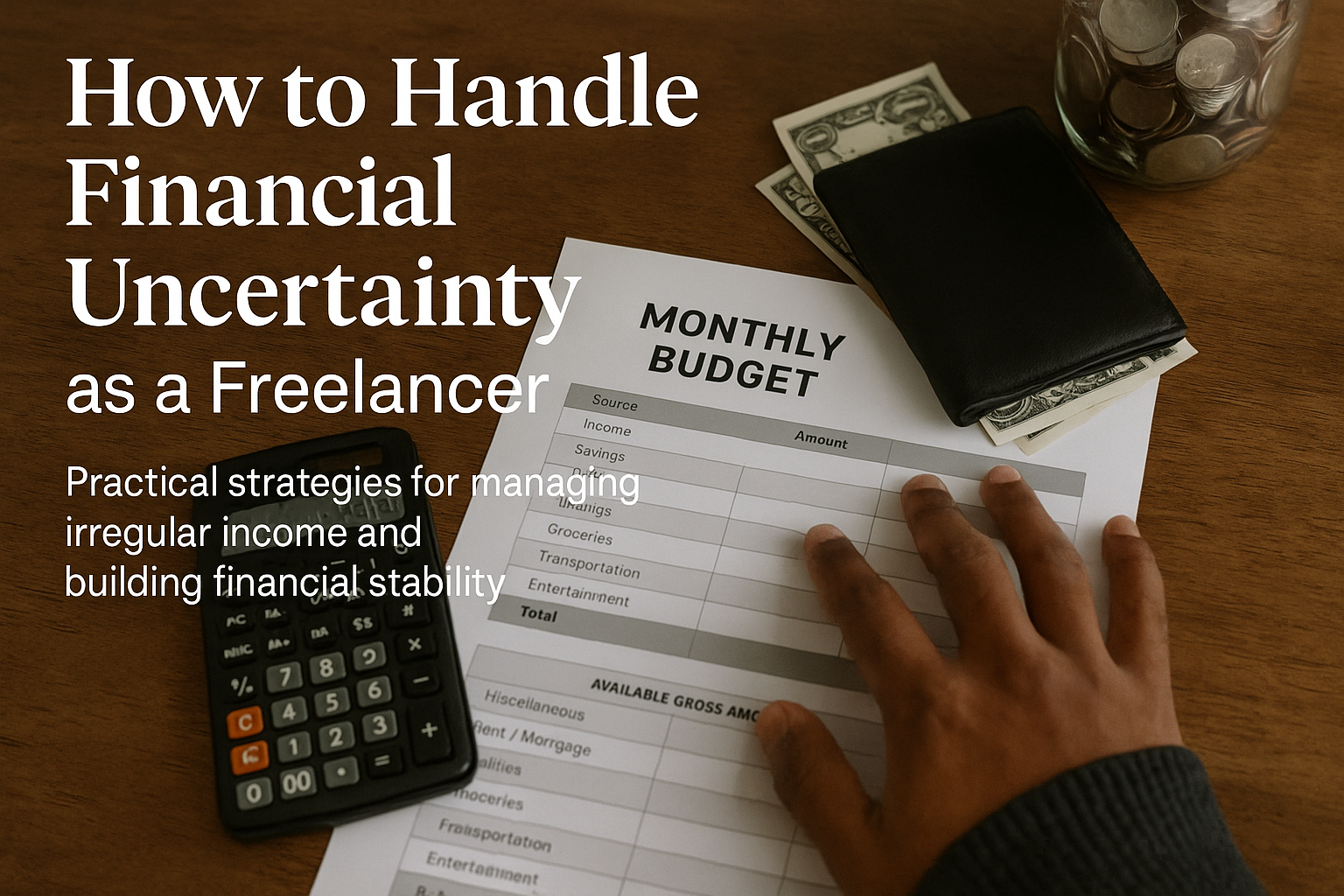One of the most common (and often intimidating) parts of freelancing is dealing with irregular income. Unlike traditional jobs, freelancers don’t always know how much they’ll earn each month. This uncertainty can create stress, affect your lifestyle, and make long-term planning feel impossible. But with the right strategies, you can build financial stability—even in a variable income career. In this article, we’ll show you how to manage financial ups and downs as a freelancer with confidence.
Why Freelance Income Is Unpredictable
Several factors contribute to fluctuating income in freelancing:
- Projects come and go
- Clients pause or cancel unexpectedly
- Slow seasons or holidays impact demand
- Payments are delayed
- You take time off without paid leave
Understanding these patterns is the first step to managing them proactively.
1. Track Every Dollar
You can’t manage what you don’t measure. Start by tracking all your income and expenses.
Use:
- Spreadsheets (Google Sheets or Excel)
- Tools like Wave, QuickBooks, or Notion
- Apps like Mint, YNAB, or Goodbudget
Track:
- Money coming in (by client and project)
- Recurring monthly expenses
- Irregular or one-time purchases
Knowing your cash flow helps you spot trends and make smarter decisions.
2. Build an Emergency Fund
An emergency fund gives you peace of mind during slow months, unexpected bills, or late client payments.
How much?
- Aim for 3 to 6 months of essential expenses
- Start small: $500 → $1,000 → $3,000 → more
Treat this as a non-negotiable buffer between you and financial panic.
3. Pay Yourself a Fixed Monthly Salary
Even if you earn different amounts each month, you can give yourself a stable income by:
- Setting a monthly “salary” (e.g., $2,500)
- Transferring that amount from your business account to your personal account
- Saving any extra income for future lean months
This method helps smooth out income volatility and makes budgeting easier.
4. Diversify Your Income Streams
Don’t rely on a single client or service. Income diversity gives you stability.
Ways to diversify:
- Offer complementary services (e.g., writing + editing)
- Sell digital products (e.g., templates, eBooks)
- Teach a skill via online courses
- Offer retainers or recurring services
- Take on part-time or short-term contracts
If one income stream dips, others can fill the gap.
5. Plan for Slow Seasons
Freelancing has cycles. Some months are busy, others are dead. Learn the rhythm of your industry.
Tips:
- Save extra during high-income months
- Plan vacations during slow periods
- Promote services in advance (e.g., in November for January)
Create seasonal strategies to stay prepared, not surprised.
6. Set Financial Goals
Set monthly, quarterly, and annual goals for income, savings, and expenses.
Examples:
- “Earn $5,000/month consistently”
- “Save $10,000 emergency fund by December”
- “Pay off $2,000 in debt this year”
Break goals into weekly actions. Tracking progress keeps you motivated and proactive.
7. Separate Business and Personal Finances
Mixing finances leads to confusion and poor money management. Keep things clean by:
- Opening a separate business bank account
- Using dedicated cards for business expenses
- Paying yourself from the business account (like a salary)
This also makes tax season much easier.
8. Use a Monthly Budget System
A budget keeps your spending aligned with your actual income.
Budget styles:
- Zero-based budgeting: Every dollar has a job
- 50/30/20 rule: 50% needs, 30% wants, 20% savings/debt
- Envelope method: Allocate cash or categories digitally
Adjust your budget monthly based on earnings and expected expenses.
9. Prepare for Taxes All Year
Taxes can be a major shock if you’re not saving throughout the year.
How to prepare:
- Set aside 25–30% of your income for taxes
- Use tools like QuickBooks Self-Employed to track deductions
- Pay quarterly taxes (if required in your country)
- Hire an accountant or use tax software
Being tax-prepared = less stress and no surprises.
10. Focus on Value, Not Just Volume
Instead of chasing dozens of low-paying clients, focus on higher-value projects that pay more and require fewer hours.
How to increase value:
- Specialize in a niche
- Improve your portfolio and pitch
- Raise your rates as experience grows
- Offer premium packages
Quality clients bring stability and respect your worth.
Final Thoughts: Stability Is Possible—Even in Freelancing
Financial uncertainty doesn’t have to define your freelance career. With the right habits, planning, and mindset, you can take control of your income and build a secure, thriving business.
Remember:
- Track your finances
- Save consistently
- Diversify and budget wisely
- Set goals and stick to them
Freelancing offers freedom—but that freedom comes with responsibility. Own it, and the rewards are worth it.

